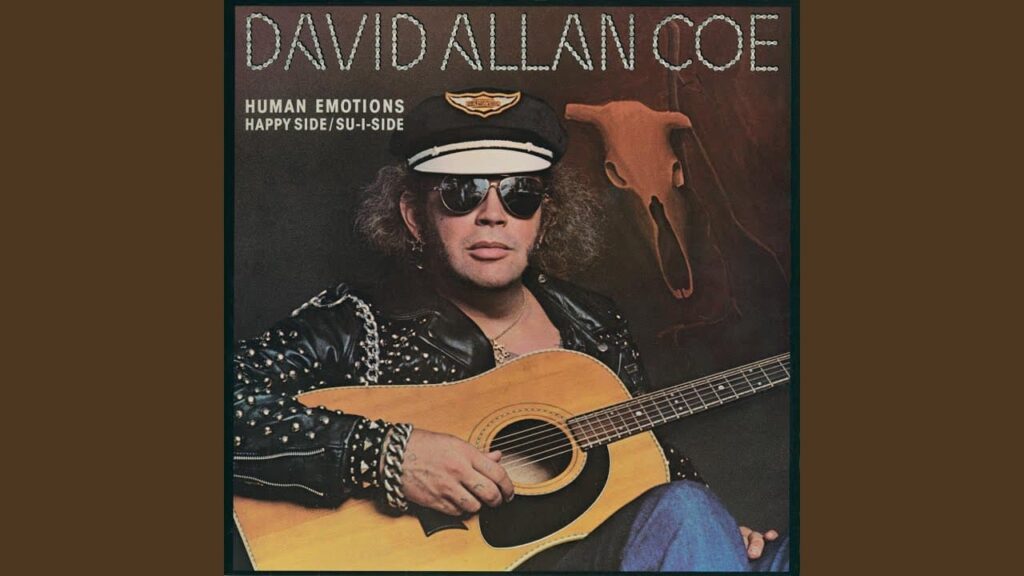
A Raw Confession of Hard-Lived Wisdom: When an Outlaw Country Voice Laid Bare the Scars of Experience.
“If This Is Just a Game,” a song that, with its stark, almost brutally honest lyrics, served as a raw confession of hard-lived experience, a testament to the disillusionment and the hard-won wisdom that comes from a life lived on the fringes, became a defining moment for an artist who never shied away from controversy. This 1978 single by David Allan Coe did not achieve significant chart success, reflecting perhaps its raw, unflinching nature. However, it resonated deeply with his core fanbase, solidifying his reputation as an uncompromising voice of outlaw country. It’s a song that grapples with the bitter realities of life, the disillusionment that comes from broken promises, and the raw, unvarnished honesty of a man who has seen the dark side of the American dream. It transforms a personal confession into a stark reflection of the human condition.
Imagine a dimly lit honky-tonk, the air thick with the scent of whiskey and the echoes of a life lived on the road. David Allan Coe, his voice a gravelly instrument of raw emotion, delivers a performance that’s both haunting and undeniably real. He sings of broken dreams, of shattered illusions, of a world that often feels like a cruel game. The song, featured on his album “Family Album,” wasn’t just a country tune; it was a raw, unfiltered confession, a testament to the artist’s ability to channel his own experiences into a stark and unflinching portrayal of life’s harsh realities. The simple acoustic instrumentation, the world-weary vocals, and the brutally honest lyrics created a sense of intimacy, a feeling that this confession was being shared in the quietest, most vulnerable of spaces.
The song’s genesis, within the context of David Allan Coe’s career, marked a period of artistic integrity and unwavering commitment to his own unique vision. He was an outlaw country artist, a figure who had always defied the conventions of the mainstream music industry. With “If This Is Just a Game,” he refused to sugarcoat the realities of life, instead offering a raw and unflinching portrayal of the disillusionment and the hard-won wisdom that comes from experience. He wasn’t simply singing a country song; he was baring his soul, offering a glimpse into the depths of his own pain and disillusionment.
For those of us who remember the late 1970s, “If This Is Just a Game” evokes a sense of raw, unvarnished honesty, a yearning for a time when country music was not afraid to confront the darker aspects of the human experience. It was a time of cultural reckoning, a time when artists were beginning to explore the complexities of the American dream, acknowledging its failures and its broken promises. Coe’s performance, with its world-weary vocals and brutally honest lyrics, offered a moment of raw emotional connection, a sense of shared disillusionment. It was a song that spoke to the deepest longings of the human heart, the desire for truth, for authenticity, and for a sense of understanding in a world that often felt cruel and unforgiving.
The song’s enduring appeal lies in its raw, unvarnished honesty and its unflinching portrayal of life’s harsh realities. It’s a reminder that even in the midst of disillusionment and pain, there’s still room for honesty, for reflection, and for a profound expression of the human condition. It’s a song that transcends genres and generations, speaking to the universal human experience of grappling with life’s complexities and seeking meaning in a world that often feels like a cruel game. And even today, decades later, David Allan Coe’s “If This Is Just a Game” retains its power to move and unsettle, its world-weary vocals and brutally honest lyrics offering a moment of raw emotional connection, a sense of shared disillusionment. It’s a testament to the power of a country song to capture the complexities of the human experience, a reminder that sometimes, the most profound emotions are expressed through a raw and unapologetic confession. It’s a song that serves as a stark reflection of the human condition, a reminder that even in the midst of life’s harsh realities, there’s still room for honesty and authenticity.